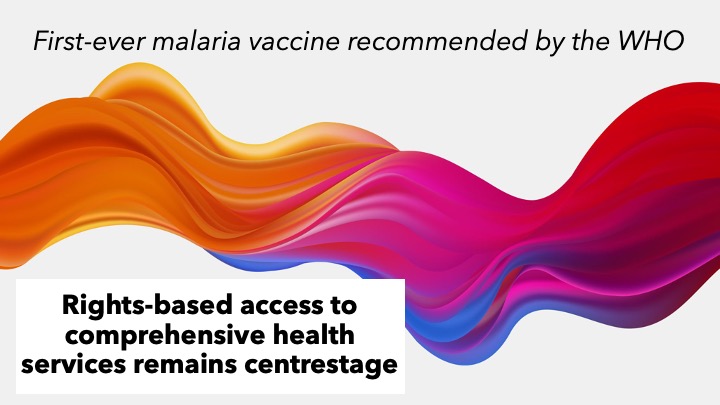Rights-based access to comprehensive health services remains centrestage
Bobby Ramakant - CNS

Malaria vaccine is critical addition to existing range of malaria prevention options
(Image by CNS) Details DMCA
It is indeed a breakthrough scientific achievement that we now have the first-ever and only malaria vaccine to prevent malaria in children. This is an important (and long-awaited) addition to existing range of scientifically proven effective methods to prevent malaria. While we celebrate this moment of yet another milestone scientific feat we must remind ourselves that this new and only vaccine is a complementary malaria control tool which needs to be added to the already proven measures for malaria prevention.
Malaria vaccine is a vital addition to malaria prevention options such as routine use of insecticide-treated bed nets, indoor spraying with insecticides, and the timely use of malaria testing and treatment. But we have to also acknowledge that access to these proven methods to save lives from malaria has been far from satisfactory, as a result of which, as per the latest data, 229 million people got malaria in 2019 (compared to 228 million in 2018), and 409,000 died of malaria in 2019 - most of them children (compared to 411,000 deaths in 2018). Children under 5 are at greatest risk of its life-threatening malaria complications. Despite unprecedented progress in in the recent two decades in the fight against this ancient disease, malaria remains one of the world's leading killers, claiming the life of one child every two minutes; and most of these deaths are in Africa.
Let us celebrate this turning point - as there is no doubt that malaria vaccine is going to be one of the blessings in the global fight to end malaria by 2030. Clock is ticking! As 110 months are left to end malaria worldwide, let us also make doubly sure we scale up the rollout and access to all the science-backed methods to save lives from malaria.
DYK about first-ever malaria vaccine?
The United Nations health agency, World Health Organization (WHO), has recommended the first-ever malaria vaccine for children, in regions with moderate to high transmission of deadliest malaria parasite (Plasmodium falciparum). This vaccine acts against this malaria parasite which not only causes the most lethal malaria globally, but also is most prevalent in Africa. The WHO recommendation of this vaccine is based on results from an ongoing pilot programme in Ghana, Kenya and Malawi that has reached more than 800,000 children since 2019.
This malaria vaccine (RTS,S/AS01) is the first, and to date the only, vaccine that has demonstrated it can significantly reduce malaria in children.
(Note: You can view every article as one long page if you sign up as an Advocate Member, or higher).





